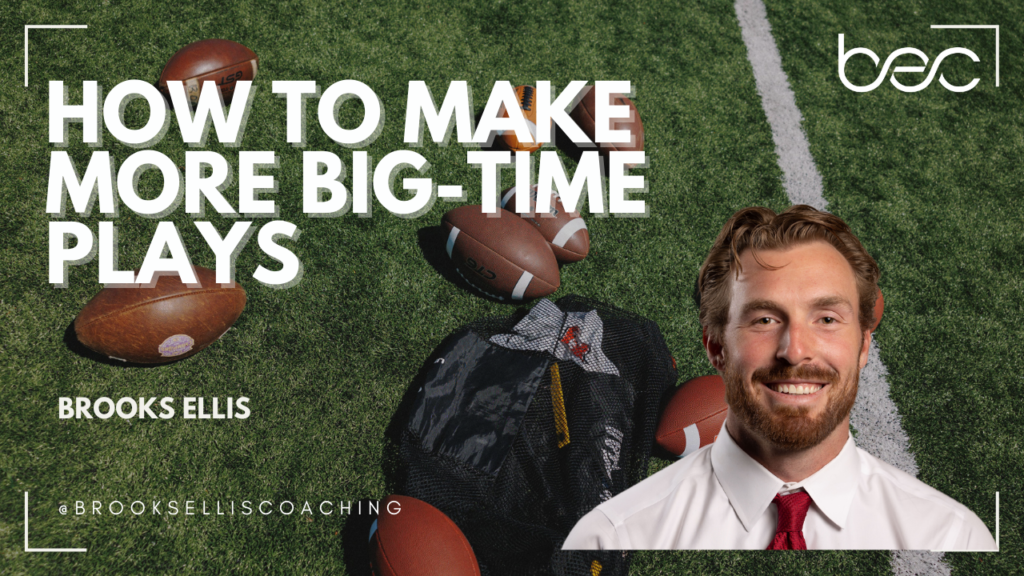HOW TO MAKE MORE BIG-TIME PLAYS
The Impact of a Big-Time Play
The best part about football is that just one play can completely transform the energy and outcome of a game. All it takes is one player to make an interception, cause a forced fumble, break one tackle, and take it into the endzone, and the team and the stadium will erupt in endless maniacal joy, the momentum shifting dramatically in your favor. All it takes is making one big-time play.
Every team is looking for more big plays. The longer you stay on the field, the greater your chances of making one—the more big plays, the greater the chance your team will secure the victory.
As a player, your goal is to make the play, and the more plays you make, the better your chances of progressing in your career are. In a team sport, your sacrifice to the team is the most important factor in team success. The more players doing what’s best for the team over what they think is best for their career or even their safety, the better the team performs.
It also helps the coaches understand who can handle and perform in a high-pressure situation. Anyone can do it in practice, with no pressure from fans and the awareness that it’s merely a practice rep to be learned from.
Big plays are game-changing plays, and if you want to be a big-time player, you must make big-time plays.
In this article, I’ll walk you through how exactly to make big-time plays so that you can experience the thrill of lighting up a stadium, putting the team on your back, and showing your fans that you may be ready to take the next step in your football career.
Preparation: The Foundation of Success
“A wicked person earns deceptive wages, but the one who sows righteousness reaps a sure reward.” Proverbs 11:18
To make the most of a game situation or capitalize on a big play opportunity, you must first be prepared. Just like a 5-year-old cannot walk on the field during an NFL game without getting immediately trampled, an ill-prepared athlete cannot be on the field, much less be in a position to make a big play.
Preparation acknowledges that value is to be earned, which comes directly from facing a challenging situation. God did not design us to simply walk through life without challenges. Oh, the joy that would bring! He created us to face the perpetual battle against evil on a daily basis, which is directly comparable to the football battlefield.
Overcoming Personal Challenges
The challenge presents itself initially as the opponent, but in truth, it’s yourself. It’s yourself in the fact that you are the one who is preventing yourself from experiencing more growth. Given the infinite amount of distractions over the course of the day, you get to decide what you spend your time on.
If what matters most to you is excelling in football, you’ll decide that football training is where you need to spend your time. And to perform at the level you’re capable of, it’s up to you to defeat the voice in your head telling you that you’re already prepared. When you’re not, then you’ve already lost the battle. You must leave no stone unturned, a strategy that proved well for players like Peyton Manning and Tom Brady as they fervently watched film up until their retirement.
The Value of Preparation in Football
In football, preparing to play makes up over 99.99% of the total time spent playing football and subsequently gives you your most significant return on investment for your performance. Given time in practice, the film room, the weight room, eating, sleeping, extra training, studying your playbook, and more, preparation is what matters most. Excuse the cliché, but failing to prepare is preparing to fail.
How do you prepare for success on the field? Like all matters, I like to adopt a comprehensive mindset. Preparing for all three factors—mind, body, and spirit—is critical for optimal performance.
Preparing the Mind
The Importance of Awareness
The mind encapsulates your ability to understand the game, learn from in-game experience, and execute split-second adjustments to in-game scenarios. (1)
Awareness is the most under-spoken and underrated skill/characteristic in football. Awareness of the plays, the flow, the patterns, your strengths, their weaknesses, etc., all influence your ability to make the play. Making one big play in a season could result from pure luck. Making 20? That’s no fluke. That’s awareness coupled with the ability on display for the world to see.
Creating Awareness
How do you create awareness? Awareness is created by replicating the scenarios you’ll experience in a game, prepping the mind for those scenarios, and prepping the mind to react in a positive manner when those scenarios arise. This is why we practice. We replicate the reps you’ll likely see in a game so that when that situation comes up, you know which technique to use and use it most effectively. Also, in a high-pressure situation, your body won’t react in an unideal fashion but will instead respond with composure and confidence because you’ve been through it before.
The Role of Repetition
A surgeon goes through 4 years of residency and fellowship to develop these skills, religiously honing their craft daily so that under the pressure of a live rep, with an actual human on the table, the surgeon can execute with precision almost without thinking. It becomes second nature, and the pressure becomes less inhibitive to their performance.
Taking more quality reps gives us a better sense of awareness, bodily control, and muscle memory, creating improved performance conditions.
Alternatives to Practice Reps
There are several things you can do to produce greater awareness. One avenue is with live reps through practice, but not every top player gets meaningful live reps. Often as the backups, it’s up to you to figure out what to do on your own. Unfair, but reality. Even in the NFL, especially in the NFL, guys who aren’t drafted who have a lower chance of making the team don’t get any reps. Your job is to be ready when the time comes. So how else do you get meaningful reps, producing awareness, creating better outcomes?
Another great option is private or group training with BEC. These personalized reps with a real coach who knows what coaches are looking for are critical for your growth as a player. As I look back on my career in football, it wasn’t during practice that I really took a leap. Practice is your live rep to make the team or to be the starter. What you do outside of practice is critical to setting yourself apart for your team and facing the competition across the region and the country if that’s what you are capable of doing. Leaving it up to your team’s training will inefficiently develop you and incompletely train you into the player you hope to be.
Film Study: A Key to Mental Preparation
Another vital element of thorough mental preparation in football is film study. While occasionally boring and seemingly monotonous, film study is a tool that ignites the cognitive frameworks that give you an expansive library of mental reps without exhausting your physical energy storehouse.
Film study is critical for improving mental capacity in the following facets:
- Correcting Game or Practice Mistakes: Correcting mistakes includes watching practice films and observing how your technique reacts to various game-like scenarios. When you see yourself live in action, with nothing to hide, you see firsthand how your technique is inefficient or ineffective and can adjust it accordingly. If you don’t know what you’re looking for, then film study can be a major waste of time just trying to find the clips that make you look good. Every human will tend towards watching the good clips and avoiding the bad, but correcting the bad is where you’ll make the biggest return on investment.
- Preparing for the Next Opponent: Preparing for the next opponent helps you identify how the opponent operates and gives the mind a plan for success. You can easily identify strengths, weaknesses, tendencies, and general strategies that you can use to predict plays more accurately before they happen.
Again, spotting the offenses’ tendencies are difficult for the untrained eye, but given the right coaching, you can maximize your film time and set yourself up for success.
Subtle things, like the pre-snap receiver alignment, the stance of the offensive linemen, or the quarterback’s demeanor, can give you a ton of information about where the play is going before the snap, obviously helping you make more plays.
You can also pick up patterns in the play calling. On specific down and distances, in the red zone, at the beginning of the game, or after a big play, what does the play caller tend to call? How do certain players play when they’re tired? All of these things can be picked up during film review, but you have to know what to look for, which is why BEC offers private and group film sessions exclusive to a specific team for obvious reasons.
- Mental Rehearsal: The last factor is mental rehearsal, a key but often missing link in training. Visualization, or priming the mind for success, is now highly researched as a critical factor in athletic success. In numerous studies, mental training visualization of the intended exercise, lifting, or sport increased strength and activation of the neural pathways, meaning the neurons were more prepared to conduct their function and improve athletic performance. (2, 3)
Film study primes your mind to be prepared for many unknown situations so your body can respond optimally. If you incorporate visualization on top of film training, you are reinforcing optimal neuronal activation and ensuring your best athletic performance.
Furthermore, by creating a habit of visualizing success in your mind, you engrain success to have already happened, and the world will conspire to make it happen. To me, this is God providing you with an answer to your prayers, having faith in His infinite essence and who loves more than anything to see His creation shine.
“When you want something, all the universe conspires in helping you to achieve it.” – Paolo Coelho.
“Ask, and it shall be given you; seek, and ye shall find; knock, and it shall be opened unto you: For everyone that asketh receiveth; and he that seeketh findeth; and to him that knocketh it shall be opened.” – Matthew 7:7-8
When you prep the mind, big plays are bound to happen because, in your mind, they already have.
Preparing the Body
Physical Conditioning and Its Cycles
Similar to priming the mind for success, the body must be prepared to go the distance with the proper technique and capacity.
The body is a biological entity that functions in cycles. Life functions as the relationship of polarity: night and day, life and death, cold and hot, contract and relax, inhale and exhale, push and pull, dry and wet. One without the other is not health or life but death and dysfunction. Football training cannot only include strain.
Avoiding Overtraining
The days of pushing yourself beyond your limit are over, as overtraining and subpar performance in high-level athletes are more common than ever before, with 35% of athletes experiencing overtraining syndrome by the time they reach adulthood. Preventing overtraining and ensuring optimal athletic performance must include a wide variety of skill training, preparing the body for various stress loads and simultaneously providing it with the proper support through nutrition, rest, and recovery that allow it to function at a high level.
My Personal Experience with Recovery
In the midst of my career, I knew about rest and recovery, but my main focus, and the main thought in my mind, was that I was being soft for not going harder, for not pushing myself harder and training more.
To no fault of anyone but myself, as recovery was a constant reminder throughout my entire career, I never knew how poor my recovery was until I started focusing on my recovery. In college, I would do extra workouts, do extra running, and spend extra time outside of the regularly scheduled workout to make sure that I was getting all the juice out of the squeeze. Still, on gameday, I didn’t feel ready. I didn’t have muscle tone, I didn’t feel confident, I didn’t have that edge that I would sporadically feel during practice.
The Impact of Poor Habits
Looking back, I remember engaging in behaviors that make zero sense now. Whether it was eating ice cream and cookies the night before games, staying up late at the bars after every game, going to the mid-week frat parties, and staying up decently late to study and to watch Grey’s Anatomy. My sleep and my health took a back seat, and so did my performance. My drive to succeed and to work hard was apparent to all watching, but I was so hard-headed that I didn’t recognize the power that recovery played in overcoming the significant stress load that I was placing upon my body.
While, to a certain extent, this strategy of always pushing helped me progress continually throughout my career, had I learned the importance of and the habits of recovery much sooner, I believe the outcomes and my performance would’ve been dramatically different.
Balancing Training with Recovery
As a competitive athlete, you already have the desire and many of the fundamental tools to take it the distance. Coaches push you hard, and you want to add more to your plate; you love the grind. That’s how it was for me. Give me more to do, or I would get bored.
Now, the easy thing to do is think that you need more to satisfy those desires. However, after my experience overcoming overtraining syndrome and a pretty severe concussion, what I see now instead is not that you need more training, but that you need more recovery and more focused periods of high-intensity training. The importance of rest and recovery cannot be understated.
The Role of Rest and Recovery
To make more plays, you must be on the field and able to endure more bursts of energy than other players while still maintaining your composure, technique, and execution. For you to endure, you must have rested the body. The cycle of life and death does not apply only to some people and not to you. I’m mostly speaking to myself here.
Like a little kid, you may think that receiving more is better for you and that pushing yourself harder will result in making more plays. However, a parent knows that giving your child the entire pizza instead of just one or a couple of slices will not be fun for anyone later on. Similarly, giving your child all of the athletic events and training all in one season will not result in greater results at any of the sports but depleted energy, lack of enjoyment, and subpar performance that prevents long-term success in the sport.
Progress Through Proper Nutrition
Progress happens slowly over time, and training requires adequate nutrition, sleep, and recovery in addition to adequate training. They cannot occur in isolation. Progress, like football, is a team sport.
My urge for both parents and players is to think of the big picture instead of the present moment. In this modern world, we want everything to happen instantaneously. The big picture is hard to see, because what’s right in front of you looks like the only thing that matters, like a moment that they’ll never get back. Let’s do all the things all at once because we can and we won’t have these days for long. However, what you can see is only an illusion, where the visible, the immediate thrill of doing all of the sports, is in opposition to the spirit.
“For the flesh desires what is contrary to the Spirit, and the Spirit what is contrary to the flesh. They are in conflict with each other, so that you are not to do whatever you want.” – Galatians 5:17
The playbook for your success has already been written. We want to see immediate success, but by pushing our limits, we fail to fully embrace the breadth of God’s promises for us.
Parents must be able to step back and see that athletic success is not dependent on doing more but on doing what you do best, better, which happens by doing less.
Fueling Your Body for Success
How do you give your body what it needs to perform at its best?
Let’s start with nutrition. The body NEEDS fuel, and it needs the right fuel. For young, burly football players, we need A LOT of the RIGHT fuel.
Unfortunately, nearly every client I work with has a problem with not eating enough food. This isn’t due to a lack of care by the parents but a lack of desire by the kids driven by a distracted state by the kids. They don’t know they’re hungry and don’t like any of the food on the table. When you get exposed to fake food early on, eating real food becomes more unrealistic.
Even if you don’t play sports, the body needs fuel. Especially if you play sports, you need lots of fuel.
The Impact of Proper Nutrition
If your kid has no energy, motivation, or drive, the problem is likely not genetics or that he isn’t pushed hard enough. Likely, they’re not eating enough.
From personal experience, I feel horrible when I deplete myself of energy after training for and running a marathon. I’ll fuel up, and I’ll feel like Superman. Imagine that!
What food do you eat?
I’ll keep it simple, cheap, and tasty. Eat colorful foods you can find on the outside of the aisles, and eat more than you usually do. Buy in bulk and use chatGPT to develop a nutrition plan based on a paleo, Whole30, or Mediterranean diet.
Understanding Caloric Needs
How much?
If you want a general idea, check out this website to calculate your general caloric needs. Calculating my own needs, I am 29, weighing 237 lbs at 6’ 2”, and I’m very active (1.725). My basal metabolic rate, the rate needed to maintain just the basic functions of my cells without ANY movement throughout the day, is 2260 calories. With movement, I need 3852 calories.
To hit those goals, I cannot skip any meals and I must prepare ahead of time to succeed. If I don’t, I notice a dramatic reduction in sleep quality and overall energy and cognition levels.
If you’re an athlete and you think you don’t eat enough, you probably don’t. EAT BRO.
Real-Life Examples of Nutrition and Performance
I hear of many clients barely eating a protein shake prior to practice, then hunching over during the middle of warmups, wondering why their stomach hurts. It’s because your body isn’t fed, and it’s wondering where your next meal will come from.
In another case, one client I train is obese and can’t make it through warmups because they’re exhausted. I asked what they’d eaten that day, and it was only a protein bar or a bowl of cereal in the morning. His body is literally BEGGING for food. What may not make sense is why they’re obese, but what’s happening is that the body is protecting itself from further harm by holding on to fat. In a stressed-out state, cortisol, the stress hormone, is released which stores fat into cells as a protective defense system.
The Consequences of Insufficient Fuel
And do you want to know why they can’t make it through warmups? Is it because they’re weak? Is it because they’re soft-minded?
NO. It’s because they haven’t had food. I don’t have the research to support this fully, but if I were a betting man, I would say that no athlete ever wants to be soft or puking in the corner and that their issue is not a matter of will but of insufficient fuel.
To make big plays, your body must be fueled up and ready to go. Without the proper fuel, your mind will be scattered, your body will be broken, and you’ll never experience all that you’re capable of experiencing.
Preparing the Spirit
The Role of Spiritual Alignment
The spiritual side is harder to see for those not looking, but it’s without a doubt the most important piece of the puzzle because it sets the foundation for the mind and the body to flourish. A disconnected spirit is one that is disconnected from God and from their true selves and seeks to please the desires of the body instead of the desires of the spirit, which leads to long-term eternal happiness and success.
When I was a young lad, what I wrote above made no sense at all. It seemed like voodoo magic or nice words with no reality. I lived in the world of what I could see and didn’t realize the world behind the physical that created the conditions for the physical to occur.
The Impact of Values on Decision-Making
What does this mean? We all value something, whether it’s money, fame, power, God, growth, connectedness, or love. What we value is the reason we do anything and make any decisions. If we value what we want over what is best for us, then what we want will most likely take priority over what we must do.
I want more money, but I know that if I just seek to make more money and sacrifice my quality of life and family time, then what is the point of living? I’ve accumulated a bunch of money, but I’m completely miserable. Instead, utilizing my God-given gifts to make money to support my family and the less fortunate, continuing to challenge and develop myself and aiming to become the person that God created me to be, is the ultimate formula for success.
Football as a Spiritual Journey
When it comes to football, it’s easy to think that the results you see on the field are the only thing that matters. Not making the plays you hoped to make or not playing as much as you wanted can derail your confidence and lead to a short-lived career.
The great thing about football is that it’s not about football, it’s about your approach to the game. The spiritual side of football is WHO you are becoming through the dedication to becoming your best self on and off the field. Football develops leaders and tough men capable of enduring, or at least it used to.
Now, with less time in actual practice, more emphasis on promoting the best players and how much swag you show on your Instagram page, and more distractions from you honing your craft, merely hoping that they’ll improve rather than guaranteeing it, players are not developing like they should, and they see a single failure as a sign they’ll never make it.
Learning from Failure
The spiritual side is understanding that failure, learning from failure, and transforming those failures into wins over the course of time, is creating the person that you are capable of becoming. Truthfully, success on the field doesn’t matter. Some people are better than others at football and that will never change. Your role is not to compare yourself to other players, but to continue to develop and grow. When players fail to see how engaging in every sport, or quitting when it gets hard or when they don’t see success, players are failing to learn the lessons that football and life are designed to give you.
Making big plays doesn’t come overnight. It’s a result of countless hours of hard work and a commitment to a personalized performance strategy. It comes easier to some people, but if that’s not you, that doesn’t mean it can’t happen. You might have to work harder, readjust your strategy, and wait a longer period of time in order to find the success you’re capable of having. Even if this approach doesn’t result in more on-field plays, it will transform you into someone who’s capable of making a massive difference and witnessing massive off-the-field success.
Execution: Putting Preparation into Practice
The Role of Execution in Success
After preparing the mind, body, and spirit, you must go on the field and execute. Preparation without execution is futile. Execution is about knowing the plays, doing your job, and handling the pressure, so when the game is on the line, you’re the one who’s confident enough to step up and get the job done. Have a team full of guys capable of doing this and who can stop you?
The Three Pillars of Execution
Execution comes down to three key elements:
- Preparation
- Discipline
- Short-term memory
The Importance of Discipline
Discipline is the foundation of results and the centerpiece of everything we do at BEC.
Think of it like a dog to its owner. What kind of energy does an undisciplined dog have? Crazy, uncontrolled, and unappealing energy. Bouncing off the walls, it’s a dog who isn’t trusted, liked, and typically unhappy. Due to a lack of discipline, they are constantly being reprimanded for their insubordination, wondering why they continue to be punished.
“As a dog returns to its vomit, so a fool repeats his folly” – Proverbs 26:11
The Role of Coaching in Discipline
Instead, by listening to instructions from those who have seen much more football than you, you can learn the proper mechanics to make more plays. By listening and taking coaching from a perspective of, “I’m here to get better,” not to show how good I already am, we can grow and develop into the players we’re capable of becoming.
We must be disciplined in everything we do. This means having the discipline and wisdom to know what is essential to achieving my goals and engaging in the actions I know will help me get there. Discipline means striving to do our job instead of trying to be the hero.
The Power of Focused Execution
Football is a team sport full of 11 different positions responsible for very different roles. Doing your job and your job alone is the only thing that matters. Try doing two things simultaneously, and you’ll do neither effectively. Discipline allows us to do our job and remove all other distractions from our minds so that we can be the best we can be.
“For the moment all discipline seems painful rather than pleasant, but later it yields the peaceful fruit of righteousness to those who have been trained by it.” – Hebrews 12:11
Adopting Short-Term Memory in Football
Last, executing your role can be immensely supported by adopting a metaphorical tool called short-term memory loss. While short-term memory loss in football is a serious symptom that should not be overlooked after a big hit, it is a mindset that prevents you from being too excited about a previous big play or too depressed about a previous negative play. You take every play one play at a time and focus on doing your job—nothing more and nothing less.
This approach helps prevent emotional swings during a game, where your confidence may take a massive toll, from influencing your energy. When you see a big play, you often see the victim of the play, the team and the player to whom it happened, become defeated. A commonly used phrase is that the wind has been taken out of their sails.
Case Study: The New England Patriots in Superbowl LI
One of the best examples of a team expressing short-term memory and the discipline to do their job is the New England Patriots in 2017 against the Atlanta Falcons in Superbowl LI. Down 28-3 at halftime, victory looked bleak and unimaginable. However, in the locker room, players reminded one another of the Patriot way, doing your job and taking it one play at a time. They put their heads down the entire rest of the way, and sure enough, came back to win.
With the mindset that the game is never over, the discipline to just do your job, and the mindset that one play cannot influence your confidence and capabilities, the big plays will come.
Reviewing and Refining Your Approach
The Role of Review in Improvement
Finally, reviewing our results and progress gives us a strategy for assessing the effectiveness of our training strategy. Similar to a film study, examining the results of our approach can help us identify which techniques in our training regimen are helpful or harmful. This gives us a better sense of how we won and allows us to replicate the process for success.
Consistency in Making Big Plays
Again, everyone can make a big play, but can you make 20? Is that process repeatable and transferable? Can you lead others to success through your process? Every business’s journey involves solving problems and building a system that produces and reproduces results. As an athlete, create a system that works, refine it, and continue to engage in that system so you can make more plays.
“The unexamined life is not worth living.” – Socrates
Increasing Awareness Through Review
When you review your strategy, you become more aware. Increasing awareness leads to more big plays, which, when reproduced, leads to more wins.
Conclusion: The Path to Big-Time Plays
We play the game to make the big plays. The interception to seal the game, the game-winning touchdown, the big hit on the quarterback, are all electrifying moments for a team. To make those big plays, it requires a dedication to preparation, execution, and review. This systematized process, translatable to any other endeavor, in business, leadership, academics, etc. is a proven way to performing at a high level.
As you look into your preparation, taking a holistic approach that covers all three mind, body, and spirit ensures that you’re developing all aspects of your game. Through film review, private or group training, you can develop your mind to have the awareness and the capability to feel calm and composed and feel the confidence needed to execute in moments of high stress.
Training the body to recover well, after pushing yourself adequately is the secret formula for extracting the most out of your training regimen. Pushing yourself over the edge, without adequate rest, is a thing of the past, and a guaranteed path to burnout and limited athletic success.
Then, setting the foundation of your training by understanding that results are less important than the growth you experience as a result of your effort and honing your strategy will set you up to maximize your training regimen if not on the field, certainly in life.
The Importance of Seeking Guidance
With this in mind, training the mind, and having a coach to go through it with you, is paramount for ensuring that you’re not leaving anything on the table. When I was a player, I was so hard-headed that I didn’t seek out advice outside of my coaches, but even then, that was a struggle.
My biggest regret as a player was that I didn’t fully tap into the resources available, and relied upon an incomplete training philosophy about what I needed. This is why BEC exists. BEC exists to provide you with a personalized roadmap that helps you identify all of the hurdles in your way and how to approach and conquer them.
Your Best Performance Awaits
Your best performance cannot happen on its own, and relying upon your own strength to get the job done is doomed for failure and regret.
Don’t be like me. Don’t allow your own ego and pride to deter you from experiencing your greatest performance. Don’t allow your ego to inhibit you from the joy of making greater plays and hopefully, earning a college scholarship.
Sign up for a free consultation today to learn more about our training programs and how we can help you accomplish your goals.
Your best performance and big-time plays are waiting.
References
- https://www.s2cognition.com/post/athlete-iq-or-athletic-intelligence-a-model-of-conceptualizing-high-sports-iq
- Slimani, M., Tod, D., Chaabene, H., Miarka, B., & Chamari, K. (2016). Effects of Mental Imagery on Muscular Strength in Healthy and Patient Participants: A Systematic Review. Journal of sports science & medicine, 15(3), 434–450.
- Ranganathan, V. K., Siemionow, V., Liu, J. Z., Sahgal, V., & Yue, G. H. (2004). From mental power to muscle power–gaining strength by using the mind. Neuropsychologia, 42(7), 944–956. https://doi.org/10.1016/j.neuropsychologia.2003.11.018
- Carfagno, D. G., & Hendrix, J. C., 3rd (2014). Overtraining syndrome in the athlete: current clinical practice. Current sports medicine reports, 13(1), 45–51. https://doi.org/10.1249/JSR.0000000000000027







